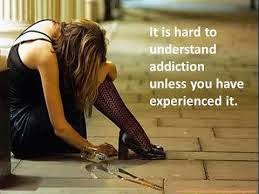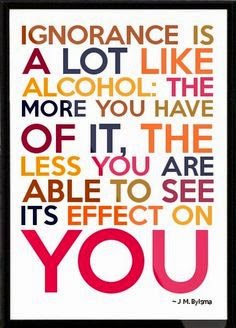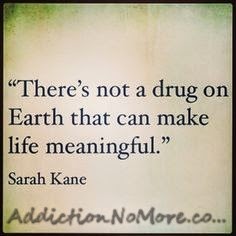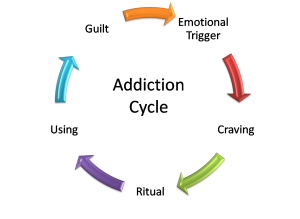Tuesday, March 31, 2015
Friday, March 27, 2015
Wednesday, March 25, 2015
Effects of Alcohol Abuse
If you or a loved one needs help for drug or alcohol addiction, please call us at 1-800-513-5423 Drug Rehab Services
ALCOHOL’S DAMAGING EFFECTS ON THE BRAIN
Difficulty walking, blurred vision, slurred speech, slowed reaction times, impaired memory: Clearly, alcohol affects the brain. Some of these impairments are detectable after only one or two drinks and quickly resolve when drinking stops. On the other hand, a person who drinks heavily over a long period of time may have brain deficits that persist well after he or she achieves sobriety. Exactly how alcohol affects the brain and the likelihood of reversing the impact of heavy drinking on the brain remain hot topics in alcohol research today.
We do know that heavy drinking may have extensive and far–reaching effects on the brain, ranging from simple “slips” in memory to permanent and debilitating conditions that require lifetime custodial care. And even moderate drinking leads to short–term impairment, as shown by extensive research on the impact of drinking on driving.
A number of factors influence how and to what extent alcohol affects the brain (1), including
how much and how often a person drinks;
the age at which he or she first began drinking, and how long he or she has been drinking;
the person’s age, level of education, gender, genetic background, and family history of alcoholism;
whether he or she is at risk as a result of prenatal alcohol exposure; and
his or her general health status.
This Alcohol Alert reviews some common disorders associated with alcohol–related brain damage and the people at greatest risk for impairment. It looks at traditional as well as emerging therapies for the treatment and prevention of alcohol–related disorders and includes a brief look at the high–tech tools that are helping scientists to better understand the effects of alcohol on the brain.
BLACKOUTS AND MEMORY LAPSES
Alcohol can produce detectable impairments in memory after only a few drinks and, as the amount of alcohol increases, so does the degree of impairment. Large quantities of alcohol, especially when consumed quickly and on an empty stomach, can produce a blackout, or an interval of time for which the intoxicated person cannot recall key details of events, or even entire events.
Blackouts are much more common among social drinkers than previously assumed and should be viewed as a potential consequence of acute intoxication regardless of age or whether the drinker is clinically dependent on alcohol (2). White and colleagues (3) surveyed 772 college undergraduates about their experiences with blackouts and asked, “Have you ever awoken after a night of drinking not able to remember things that you did or places that you went?” Of the students who had ever consumed alcohol, 51 percent reported blacking out at some point in their lives, and 40 percent reported experiencing a blackout in the year before the survey. Of those who reported drinking in the 2 weeks before the survey, 9.4 percent said they blacked out during that time. The students reported learning later that they had participated in a wide range of potentially dangerous events they could not remember, including vandalism, unprotected sex, and driving.
Binge Drinking and Blackouts
• Drinkers who experience blackouts typically drink too much and too quickly, which causes their blood alcohol levels to rise very rapidly. College students may be at particular risk for experiencing a blackout, as an alarming number of college students engage in binge drinking. Binge drinking, for a typical adult, is defined as consuming five or more drinks in about 2 hours for men, or four or more drinks for women.
Equal numbers of men and women reported experiencing blackouts, despite the fact that the men drank significantly more often and more heavily than the women. This outcome suggests that regardless of the amount of alcohol consumption, females—a group infrequently studied in the literature on blackouts—are at greater risk than males for experiencing blackouts. A woman’s tendency to black out more easily probably results from differences in how men and women metabolize alcohol. Females also may be more susceptible than males to milder forms of alcohol–induced memory impairments, even when men and women consume comparable amounts of alcohol (4).
ARE WOMEN MORE VULNERABLE TO ALCOHOL’S EFFECTS ON THE BRAIN?
Women are more vulnerable than men to many of the medical consequences of alcohol use. For example, alcoholic women develop cirrhosis (5), alcohol–induced damage of the heart muscle (i.e., cardiomyopathy) (6), and nerve damage (i.e., peripheral neuropathy) (7) after fewer years of heavy drinking than do alcoholic men. Studies comparing men and women’s sensitivity to alcohol–induced brain damage, however, have not been as conclusive.
Using imaging with computerized tomography, two studies (8,9) compared brain shrinkage, a common indicator of brain damage, in alcoholic men and women and reported that male and female alcoholics both showed significantly greater brain shrinkage than control subjects. Studies also showed that both men and women have similar learning and memory problems as a result of heavy drinking (10). The difference is that alcoholic women reported that they had been drinking excessively for only about half as long as the alcoholic men in these studies. This indicates that women’s brains, like their other organs, are more vulnerable to alcohol–induced damage than men’s (11).
Yet other studies have not shown such definitive findings. In fact, two reports appearing side by side in the American Journal of Psychiatry contradicted each other on the question of gender–related vulnerability to brain shrinkage in alcoholism (12,13). Clearly, more research is needed on this topic, especially because alcoholic women have received less research attention than alcoholic men despite good evidence that women may be particularly vulnerable to alcohol’s effects on many key organ systems.
BRAIN DAMAGE FROM OTHER CAUSES
People who have been drinking large amounts of alcohol for long periods of time run the risk of developing serious and persistent changes in the brain. Damage may be a result of the direct effects of alcohol on the brain or may result indirectly, from a poor general health status or from severe liver disease.
For example, thiamine deficiency is a common occurrence in people with alcoholism and results from poor overall nutrition. Thiamine, also known as vitamin B1, is an essential nutrient required by all tissues, including the brain. Thiamine is found in foods such as meat and poultry; whole grain cereals; nuts; and dried beans, peas, and soybeans. Many foods in the United States commonly are fortified with thiamine, including breads and cereals. As a result, most people consume sufficient amounts of thiamine in their diets. The typical intake for most Americans is 2 mg/day; the Recommended Daily Allowance is 1.2 mg/day for men and 1.1 mg/day for women (14).
Wernicke–Korsakoff Syndrome
Up to 80 percent of alcoholics, however, have a deficiency in thiamine (15), and some of these people will go on to develop serious brain disorders such as Wernicke–Korsakoff syndrome (WKS) (16). WKS is a disease that consists of two separate syndromes, a short–lived and severe condition called Wernicke’s encephalopathy and a long–lasting and debilitating condition known as Korsakoff’s psychosis.
The symptoms of Wernicke’s encephalopathy include mental confusion, paralysis of the nerves that move the eyes (i.e., oculomotor disturbances), and difficulty with muscle coordination. For example, patients with Wernicke’s encephalopathy may be too confused to find their way out of a room or may not even be able to walk. Many Wernicke’s encephalopathy patients, however, do not exhibit all three of these signs and symptoms, and clinicians working with alcoholics must be aware that this disorder may be present even if the patient shows only one or two of them. In fact, studies performed after death indicate that many cases of thiamine deficiency–related encephalopathy may not be diagnosed in life because not all the “classic” signs and symptoms were present or recognized.
Human Brain
Regions vulnerable to alcohol
Schematic drawing of the human brain, showing regions vulnerable to alcoholism-related abnormalities.
Approximately 80 to 90 percent of alcoholics with Wernicke’s encephalopathy also develop Korsakoff’s psychosis, a chronic and debilitating syndrome characterized by persistent learning and memory problems. Patients with Korsakoff’s psychosis are forgetful and quickly frustrated and have difficulty with walking and coordination (17). Although these patients have problems remembering old information (i.e., retrograde amnesia), it is their difficulty in “laying down” new information (i.e., anterograde amnesia) that is the most striking. For example, these patients can discuss in detail an event in their lives, but an hour later might not remember ever having the conversation.
Treatment
The cerebellum, an area of the brain responsible for coordinating movement and perhaps even some forms of learning, appears to be particularly sensitive to the effects of thiamine deficiency and is the region most frequently damaged in association with chronic alcohol consumption. Administering thiamine helps to improve brain function, especially in patients in the early stages of WKS. When damage to the brain is more severe, the course of care shifts from treatment to providing support to the patient and his or her family (18). Custodial care may be necessary for the 25 percent of patients who have permanent brain damage and significant loss of cognitive skills (19).
Scientists believe that a genetic variation could be one explanation for why only some alcoholics with thiamine deficiency go on to develop severe conditions such as WKS, but additional studies are necessary to clarify how genetic variants might cause some people to be more vulnerable to WKS than others.
LIVER DISEASE
Most people realize that heavy, long–term drinking can damage the liver, the organ chiefly responsible for breaking down alcohol into harmless byproducts and clearing it from the body. But people may not be aware that prolonged liver dysfunction, such as liver cirrhosis resulting from excessive alcohol consumption, can harm the brain, leading to a serious and potentially fatal brain disorder known as hepatic encephalopathy (20).
Hepatic encephalopathy can cause changes in sleep patterns, mood, and personality; psychiatric conditions such as anxiety and depression; severe cognitive effects such as shortened attention span; and problems with coordination such as a flapping or shaking of the hands (called asterixis). In the most serious cases, patients may slip into a coma (i.e., hepatic coma), which can be fatal.
New imaging techniques have enabled researchers to study specific brain regions in patients with alcoholic liver disease, giving them a better understanding of how hepatic encephalopathy develops. These studies have confirmed that at least two toxic substances, ammonia and manganese, have a role in the development of hepatic encephalopathy. Alcohol–damaged liver cells allow excess amounts of these harmful byproducts to enter the brain, thus harming brain cells.
Treatment
Physicians typically use the following strategies to prevent or treat the development of hepatic encephalopathy.
Treatment that lowers blood ammonia concentrations, such as administering L–ornithine L–aspartate.
Techniques such as liver–assist devices, or “artificial livers,” that clear the patients’ blood of harmful toxins. In initial studies, patients using these devices showed lower amounts of ammonia circulating in their blood, and their encephalopathy became less severe (21).
Liver transplantation, an approach that is widely used in alcoholic cirrhotic patients with severe (i.e., end–stage) chronic liver failure. In general, implantation of a new liver results in significant improvements in cognitive function in these patients (22) and lowers their levels of ammonia and manganese (23).
ALCOHOL AND THE DEVELOPING BRAIN
Drinking during pregnancy can lead to a range of physical, learning, and behavioral effects in the developing brain, the most serious of which is a collection of symptoms known as fetal alcohol syndrome (FAS). Children with FAS may have distinct facial features (see illustration). FAS infants also are markedly smaller than average. Their brains may have less volume (i.e., microencephaly). And they may have fewer numbers of brain cells (i.e., neurons) or fewer neurons that are able to function correctly, leading to long–term problems in learning and behavior.
Fetal Alcohol Syndrome
FAS facial features
Children with fetal alcohol syndrome (FAS) may have distinct facial features.
Treatment
Scientists are investigating the use of complex motor training and medications to prevent or reverse the alcohol–related brain damage found in people prenatally exposed to alcohol (24). In a study using rats, Klintsova and colleagues (25) used an obstacle course to teach complex motor skills, and this skills training led to a re–organization in the adult rats’ brains (i.e., cerebellum), enabling them to overcome the effects of the prenatal alcohol exposure. These findings have important therapeutic implications, suggesting that complex rehabilitative motor training can improve motor performance of children, or even adults, with FAS.
Scientists also are looking at the possibility of developing medications that can help alleviate or prevent brain damage, such as that associated with FAS. Studies using animals have yielded encouraging results for treatments using antioxidant therapy and vitamin E. Other preventive therapies showing promise in animal studies include 1–octanol, which ironically is an alcohol itself. Treatment with l–octanol significantly reduced the severity of alcohol’s effects on developing mouse embryos (26). Two molecules associated with normal development (i.e., NAP and SAL) have been found to protect nerve cells against a variety of toxins in much the same way that octanol does (27). And a compound (MK–801) that blocks a key brain chemical associated with alcohol withdrawal (i.e., glutamate) also is being studied. MK–801 reversed a specific learning impairment that resulted from early postnatal alcohol exposure (28).
Though these compounds were effective in animals, the positive results cited here may or may not translate to humans. Not drinking during pregnancy is the best form of prevention; FAS remains the leading preventable birth defect in the United States today.
GROWING NEW BRAIN CELLS
For decades scientists believed that the number of nerve cells in the adult brain was fixed early in life. If brain damage occurred, then, the best way to treat it was by strengthening the existing neurons, as new ones could not be added. In the 1960s, however, researchers found that new neurons are indeed generated in adulthood—a process called neurogenesis (29). These new cells originate from stem cells, which are cells that can divide indefinitely, renew themselves, and give rise to a variety of cell types. The discovery of brain stem cells and adult neurogenesis provides a new way of approaching the problem of alcohol–related changes in the brain and may lead to a clearer understanding of how best to treat and cure alcoholism (30).
For example, studies with animals show that high doses of alcohol lead to a disruption in the growth of new brain cells; scientists believe it may be this lack of new growth that results in the long–term deficits found in key areas of the brain (such as hippocampal structure and function) (31,32). Understanding how alcohol interacts with brain stem cells and what happens to these cells in alcoholics is the first step in establishing whether the use of stem cell therapies is an option for treatment (33).
Alcoholics are not all alike. They experience different degrees of impairment, and the disease has different origins for different people. Consequently, researchers have not found conclusive evidence that any one variable is solely responsible for the brain deficits found in alcoholics. Characterizing what makes some alcoholics vulnerable to brain damage whereas others are not remains the subject of active research (34).
The good news is that most alcoholics with cognitive impairment show at least some improvement in brain structure and functioning within a year of abstinence, though some people take much longer (35–37). Clinicians must consider a variety of treatment methods to help people stop drinking and to recover from alcohol–related brain impairments, and tailor these treatments to the individual patient.
Advanced technology will have an important role in developing these therapies. Clinicians can use brain–imaging techniques to monitor the course and success of treatment, because imaging can reveal structural, functional, and biochemical changes in living patients over time. Promising new medications also are in the early stages of development, as researchers strive to design therapies that can help prevent alcohol’s harmful effects and promote the growth of new brain cells to take the place of those that have been damaged by alcohol.
Using High–Tech Tools to Assess Alcoholic Brain Damage
Researchers studying the effects of alcohol use on the brain are aided by advanced technology such as magnetic resonance imaging (MRI), diffusion tensor imaging (DTI), positron emission tomography (PET), and electrophysiological brain mapping. These tools are providing valuable insight into how alcohol affects the brain’s structure and function.
Long–term heavy drinking may lead to shrinking of the brain and deficiencies in the fibers (white matter) that carry information between brain cells (gray matter). MRI and DTI are being used together to assess the brains of patients when they first stop chronic heavy drinking and again after long periods of sobriety, to monitor for possible relapse to drinking (38).
Memory formation and retrieval are highly influenced by factors such as attention and motivation (39). Studies using MRI are helping scientists to determine how memory and attention improve with long-time abstinence from alcohol, as well as what changes take place when a patient begins drinking again. The goal of these studies is to determine which alcohol–induced effects on the brain are permanent and which ones can be reversed with abstinence.
PET imaging is allowing researchers to visualize, in the living brain, the damage that results from heavy alcohol consumption (40). This “snapshot” of the brain’s function enables scientists to analyze alcohol’s effects on various nerve cell communication systems (i.e., neurotransmitter systems) as well as on brain cell metabolism and blood flow within the brain. These studies have detected deficits in alcoholics, particularly in the frontal lobes, which are responsible for numerous functions associated with learning and memory, as well as in the cerebellum, which controls movement and coordination. PET also is a promising tool for monitoring the effects of alcoholism treatment and abstinence on damaged portions of the brain and may help in developing new medications to correct the chemical deficits found in the brains of people with alcohol dependence.
Another high–tech tool, electroencephalography (EEG), records the brain’s electrical signals (41). Small electrodes are placed on the scalp to detect this electrical activity, which then is magnified and graphed as brain waves (i.e., neural oscillations). These brain waves show real–time activity as it happens in the brain.
Many male alcoholics have a distinctive electrophysiological profile—that is, a low amplitude of their P3 components (see figure). P3 amplitudes in women alcoholics also are reduced, although to a lesser extent than in men. For many years it was assumed that the P3 deficit observed in alcoholics was the result of alcohol’s damage to the brain. Then it was determined that while many of the clinical symptoms and electrophysiological measures associated with alcoholism return to normal after abstinence, the P3 amplitude abnormality persists (42).
graph
The P3 component is reduced in alcoholics compared with control subjects.
This continued deficit in long–term abstinent alcoholics suggests that P3 deficits may be a marker of risk for alcohol dependence, rather than a result of alcohol use. In fact, a number of studies have since reported low P3 amplitudes in young people who have not started drinking alcohol but who are at high risk for developing alcoholism, such as young sons of alcoholic fathers (43,44). Markers such as the P3 can help identify people who may be at greatest risk for developing problems with alcohol.
References
(1) Parsons, O.A. Alcohol abuse and alcoholism. In: Nixon, S.J., ed. Neuropsychology for Clinical Practice. Washington, DC: American Psychological Press, 1996. pp. 175–201. (2) White, A.M. What happened? Alcohol, memory blackouts, and the brain. Alcohol Research & Health 27(2):186–196, 2003. (3) White, A.M.; Jamieson–Drake, D.W.; and Swartzwelder, H.S. Prevalence and correlates of alcohol–induced blackouts among college students: Results of an e–mail survey. Journal of American College Health 51:117–131, 2002. (4) Mumenthaler, M.S.; Taylor, J.L.; O’Hara, R.; et al. Gender differences in moderate drinking effects. Alcohol Research & Health 23:55–64, 1999. (5) Loft, S.; Olesen, K.L.; and Dossing, M. Increased susceptibility to liver disease in relation to alcohol consumption in women. Scandinavian Journal of Gastroenterology 22: 1251–1256, 1987. (6) Fernandez– Sola, J.; Estruch, R.; Nicolas, J.M.; et al. Comparison of alcoholic cardiomyopathy in women versus men. American Journal of Cardiology 80:481–485, 1997. (7) Ammendola, A.; Gemini, D.; Iannacone, S.; et al. Gender and peripheral neuropathy in chronic alcoholism: A clinical–electroneurographic study. Alcohol and Alcoholism 35:368–371, 2000. (8) Jacobson, R. The contributions of sex and drinking history to the CT brain scan changes in alcoholics. Psychological Medicine 16:547–559, 1986. (9) Mann, K.; Batra, A.; Gunther, A.; and Schroth, G. Do women develop alcoholic brain damage more readily than men? Alcoholism: Clinical and Experimental Research 16(6):1052–1056, 1992. (10) Nixon, S.; Tivis, R.; and Parsons, O. Behavioral dysfunction and cognitive efficiency in male and female alcoholics. Alcoholism: Clinical and Experimental Research 19(3):577–581, 1995. (11) Hommer, D.W. Male and female sensitivity to alcohol–induced brain damage. Alcohol Research & Health 27(2):181–185, 2003. (12) Hommer, D.W.; Momenan, R.; Kaiser, E.; and Rawlings, R.R. Evidence for a gender–related effect of alcoholism on brain volumes. American Journal of Psychiatry 158:198–204, 2001. (13) Pfefferbaum, A.; Rosenbloom, M.; Deshmukh, A.; and Sullivan, E. Sex differences in the effects of alcohol on brain structure. American Journal of Psychiatry 158:188–197, 2001. (14) National Academy of Sciences. Dietary reference intakes for thiamin, riboflavin, niacin, vitamin B6, folate, vitamin B12, pantothenic acid, biotin, and choline. 1999. (15) Morgan, M.Y. Alcohol and nutrition. British Medical Bulletins 38:21–29, 1982. (16) Martin, P.R.; Singleton, C.K.; and Hiller–Sturmhöfel, S.H. The role of thiamine in alcoholic brain disease. Alcohol Research & Health 27(2):134–142, 2003. (17) Victor, M.; Davis, R.D.; and Collins, G.H. The Wernicke–Korsakoff Syndrome and Related Neurologic Disorders Due to Alcoholism and Malnutrition. Philadelphia: F.A. Davis, 1989. (18) Martin, P. “Wernicke–Korsakoff syndrome: Alcohol–related dementia.” Family Caregiver Alliance Fact Sheet, 1998. (19) Cook, C. “The Wernicke–Korsakoff syndrome can be treated.” The Medical Council on Alcohol, vol. 19, 2000. (20) Butterworth, R.F. Hepatic encephalopathy—A serious complication of alcoholic liver disease. Alcohol Research & Health 27(2):143–145, 2003. (21) Mitzner, S.R., and Williams, R. Albumin dialysis MARS 2003. Liver International 23(Suppl. 3):1–72, 2003. (22) Arria, A.M.; Tarter, R.E.; Starzl, T.E.; and Van Thiel, D.H. Improvement in cognitive functioning of alcoholics following orthotopic liver transplantation. Alcoholism: Clinical and Experimental Research 15(6):956–962, 1991. (23) Pujol, A.; Pujol, J.; Graus, F.; et al. Hyperintense globus pallidus on T1–weighted MRI in cirrhotic patients is associated with severity of liver failure. Neurology 43:65–69, 1993. (24) Chen, W–J.A.; Maier, S.E.; Parnell, S.E.; and West, J.E. Alcohol and the developing brain: Neuroanatomical studies. Alcohol Research & Health 27(2):174–180, 2003. (25) Klintsova, A.Y.; Scamra, C.; Hoffman, M.; et al. Therapeutic effects of complex motor training on motor performance deficits induced by neonatal binge–like alcohol exposure in rats: II. A quantitative stereological study of synaptic plasticity in female rat cerebellum. Brain Research 937:83–93, 2002. (26) Chen, S.Y.; Wilkemeyer, M.F.; Sulik, K.K.; and Charness, M.E. Octanol antagonism of ethanol teratogenesis. FASEB Journal 15:1649–1651, 2001. (27) Spong, C.Y.; Abebe, D.T.; Gozes, I.; et al. Prevention of fetal demise and growth restriction in a mouse model of fetal alcohol syndrome. Journal of Pharmacology and Experimental Therapeutics 297:774–779, 2001. (28) Thomas, J.D.; Fleming, S.L.; and Riley, E.P. Administration of low doses of MK–801 during ethanol withdrawal in the developing rat pup attenuates alcohol’s teratogenic effects. Alcoholism: Clinical and Experimental Research 26(8):1307–1313, 2002. (29) Altman, J., and Das, G.D. Autoradiographic and histological evidence of postnatal hippocampal neurogenesis in rats. Journal of Comparative Neurology 124(3):319–335, 1965. (30) Crews, F.T., and Nixon, K. Alcohol, neural stem cells, and adult neurogenesis. Alcohol Research & Health 27(2): 197–204, 2003. (31) Nixon, K., and Crews, F.T. Binge ethanol exposure decreases neurogenesis in adult rat hippocampus. Journal of Neurochemistry 83(5):1087–1093, 2002. (32) Herrera, D.G.; Yague, A.G.; Johnsen–Soriano, S.; et al. Selective impairment of hippocampal neurogenesis by chronic alcoholism: Protective effects of an antioxidant. Proceedings of the National Academy of Science of the U.S.A. 100(13):7919–7924, 2003. (33) Crews, F.T.; Miller, M.W.; Ma, W.; et al. Neural stem cells and alcohol. Alcoholism: Clinical and Experimental Research 27(2):324–335, 2003. (34) Oscar–Berman, M., and Marinkovic, K. Alcoholism and the brain: An overview. Alcohol Research & Health 27(2):125–133, 2003. (35) Bates, M.E.; Bowden, S.C.; and Barry, D. Neurocognitive impairment associated with alcohol use disorders: Implications for treatment. Experimental and Clinical Psychopharmacology 10(3):193–212, 2002. (36) Gansler, D.A.; Harris, G.J.; Oscar–Berman, M.; et al. Hypoperfusion of inferior frontal brain regions in abstinent alcoholics: A pilot SPECT study. Journal of Studies on Alcohol 61:32–37, 2000. (37) Sullivan, E.V.; Rosenbloom, M.J.; Lim, K.O.; and Pfefferbaum, A. Longitudinal changes in cognition, gait, and balance in abstinent and relapsed alcoholic men: Relationships to changes in brain structure. Neuropsychology 14:178–188, 2000. (38) Rosenbloom, M.; Sullivan, E.V.; and Pfefferbaum, A. Using magnetic resonance imaging and diffusion tensor imaging to assess brain damage in alcoholics. Alcohol Research & Health 27(2):146–152, 2003. (39) Kensinger, E.A.; Clarke, R.J.; and Corkin, S. What neural correlates underlie successful encoding and retrieval? A functional magnetic resonance imaging study using a divided attention paradigm. Journal of Neuroscience 23(6):2407–2415, 2003. (40) Wong, D.F.; Maini, A.; Rousset, O.G.; and Brasíc , J.R. Positron emission tomography—A tool for identifying the effects of alcohol dependence on the brain. Alcohol Research & Health 27(2):161–173, 2003. (41) Porjesz, B., and Begleiter, H. Alcoholism and human electrophysiology. Alcohol Research & Health 27(2):153–160, 2003. (42) Porjesz, B., and Begleiter, H. Human brain electrophysiology and alcoholism. In: Tarter, R., and Van Thiel, D., eds. Alcohol and the Brain. New York: Plenum, 1985. pp. 139–182. (43) Begleiter, H.; Porjesz, B.; Bihari, B.; and Kissin, B. Event–related potentials in boys at risk for alcoholism. Science 225:1493–1496, 1984. (44) Polich, J.; Pollock, V.E.; and Bloom, F.E. Meta–analysis of P300 amplitude from males at risk for alcoholism. Psychological Bulletin 115:55–73, 1994.
Resources
Volume 27 Number 2 Journal cover
Source material for this Alcohol Alert originally appeared in the journal Alcohol Research & Health, “Alcoholic Brain Damage” (Vol. 27, No. 2, 2003).
Alcohol Research & Health is the quarterly, peer–reviewed journal published by the National Institute on Alcohol Abuse and Alcoholism. Each issue of AR&H provides in–depth focus on a single topic in the field of alcohol research.
Back issues of Alcohol Research & Health and additional resources can be downloaded from NIAAA’s Web site, www.niaaa.nih.gov. Subscriptions are available from the Superintendent of Documents for $25. Write to New Orders, Superintendent of Documents, P.O. Box 371954, Pittsburgh, PA 15250–7954; or fax 202/512–2250.
Info found on http://pubs.niaaa.nih.gov/publications/aa63/aa63.htm
Thursday, March 19, 2015
For help finding an intervention call 1-800-513-5423 today
Christian Intervention Help Line
When confronted with a loved one that is trapped by Drug addiction , or alcohol addiction, it is very common to feel helpless with no place to turn for help. Having been through this on a personal level there is a constant concern about their safety, health and well being. When the person that you once knew is now gone and changed what do you do? Once Addiction to alcohol or drugs takes hold of someone's life it can have devastating and have life changing consequences, and even death.
Do not wait for the addicted person to come to you for help
Witing until a person comes to us for help is an ideal situation that we all hope comes but waiting for this to happen can cause more harm than good. Thinking that the addict will WAKE UP and ask for help is a way not to confront the situation at hand and results in more heartache and pain for both parties involved
Together with a Christian intervention and planning we can get the person to have that moment of clear thinking that will bring them to acceptance of help. There is no gift greater that you can give than life itself. Our Caring and genuinely concerned, Christian counselors are here to help you find a Christian interventionist. Our Christian counselors are waiting on your call 7 days a week 24 hours a day
The Christian Intervention process also known as a faith-based intervention is the right type of intervention for someone that was brought up with Christian values and has lost their way. At one point in their life there was a time that they were doing great in their faith and in life. Addiction to drugs or alcohol will start to separate them from all things that are good in their life including family, friends, and any and all church related activities. The individual starts to feel affected by all things and the many unhandled situations that cause feelings of remorse and guilt. These feelings of remorse, guilt, and hopelessness perpetuate the addiction to drugs or alcohol and block them from seeing the light of the lord that has never stopped. The feelings that the individual feels are not real feelings they are fueled by Drugs or Alcohol and this is how they keep from handling life.
THE CHRISTIAN INTERVENTION
When is a good time to hold a intervention for a loved one?
When their world is slowly being taken apart or perhaps they loose their job, or are always having money problems. These are all warning signs of something under the surface is going on in their life. You will also see a decline in family and church activities. When the family discovers that their is a chance to bring them back before it is too late. Speaking with an intervention provider and specialist can help you learn at the least that there is hope.
A Christian family intervention can and will bring the family back together.
Once the Christian interventionist gets to the first meeting place, (usually the family home) the interventionist gives his own testimony and the family begins to feel a since of hope and empowerment. It is then that the hard work starts, with helping the family be able to be cause over the situation in such a manner that the loved one they are helping does not feel forced or trapped. The best possible out come for a Christian intervention is for them to feel that they are better than they are now and they need help to find their way back. Once the family starts to read their letters and talk to them the spirit will fill the room and help us. After we have handled all the objections one at a time there is always a long pause as a sense of relief passes through them and this is the moment where we can see God's hand touching them through a Christian intervention.
It is not God that gave up on them but them that gave up on God. Christian interventions can help lift the cloud of addiction covering them. With God's power, we will help them see that their light still shines and can be fueled to burn bright.
Call us today 1-800-513-5423 and ask about our Christian interventionists http://drugrehabservices.com/
* Call us toll free and our certified interventionists will find the closest and best fit for an interventionist. Someone that has things in common with the person that the intervention is for. We will also discuss how to handle the substance abuser until we are ready to get the intervention scheduled.
* The plan is set into motion to reach out to as many of the family and friend as possible and set up a face to face meeting day. This what is called a pre-intervention is so we can make sure that there is no antagonism and hard feeling that can get in the way of a successful Christian intervention.
* At the pre-intervention we will set up the rules that we will develop and follow during the intervention. this also includes being able to voice thoughts and worries regarding your loved ones addiction to drugs or alcohol.
* eliminating the what ifs training and communication skills is taught as well during the Pre-intervention day.
* Christian drug and alcohol interventions are always held in a caring and loving manner. When a person has an addiction problem they have already torn themselves down so they need to be built back up.
* The intervention purpose is to make the individual feel love, caring, and the hand of God touching them. At this point they will be taken to the facility of your choice within the next 24 hours.
1-800-513-5423 http://drugrehabservices.com/
Monday, March 16, 2015
Recovery from addiction
Recovery from addiction
(If you or a loved one needs help in recovery, please contact us at 1-800-513-5423 www.drugrehabservices.com)
Although millions of individuals and family members who are “in recovery” know what “recovery” means to them and how important it is in their lives, up until relatively recently there was no formal, accepted definition of recovery.
For the general public and for those who research, evaluate, and develop policies about alcoholism and drug addiction, recovery is a concept that can sometimes seem unclear. Even worse, to the general public, the term “recovery” is seen as “someone who is trying to stop using alcohol or other drugs.” Clearly, it’s time for a change.
Essentially, recovery from alcoholism and drug addiction is a complex and dynamic process encompassing all the positive benefits to physical, mental and social health that can happen when people with an addiction to alcohol or drugs, or their family members, get the help they need.
Recently (November 2014), the Alcohol Research Group at the Public Health Institute posted its definition of recovery. According to the Group, "Recovery is a goal of alcohol treatment, and recovery-oriented systems of care are being developed to support that goal. Alcoholics who no longer drink, and are trying to pursue an improved way of living/being, say that they are 'in recovery.'" Click here to download "What is Recovery?"
Prior to this latest update, there were two major efforts to develop a definition for recovery. Here is a quick overview of the findings and suggested definitions:
In 2007, according to the Betty Ford Institute Consensus Panel, What Is Recovery?:
“Recovery from substance dependence is a voluntarily maintained lifestyle characterized by sobriety, personal health, and citizenship.”
In 2005, the Substance Abuse and Mental Health Services Administration (SAMHSA) offered the following Working Definition of Recovery:
“Recovery from alcohol and drug problems is a process of change through which an individual achieves abstinence and improved health, wellness and quality of life.”
Expanding on this definition, SAMHSA articulated twelve “Guiding Principles of Recovery”:
There are many pathways to recovery.
Recovery is self-directed and empowering.
Recovery involves a personal recognition of the need for change and transformation.
Recovery is holistic.
Recovery has cultural dimensions.
Recovery exists on a continuum of improved health and wellness.
Recovery is supported by peers and allies.
Recovery emerges from hope and gratitude.
Recovery involves a process of healing and self-redefinition.
Recovery involves addressing discrimination and transcending shame and stigma.
Recovery involves (re)joining and (re)building a life in the community.
Recovery is a reality. It can, will, and does happen.
In May 2011, a SAMHSA blog posting released Recovery Defined: A Unified Working Definition and Set of Principles that reflects SAMHSA’s move into a “behavioral health definition” of recovery that is inclusive of both addiction to alcohol and drugs as well as mental health recovery.
SAMHSA Working Definition of Recovery:
“Recovery is a process of change whereby individuals work to improve their own health and wellness and to live a meaningful life in a community of their choice while striving to achieve their full potential.”
SAMHSA Principles of Recovery
Person-driven;
Occurs via many pathways;
Is holistic;
Is supported by peers;
Is supported through relationships;
Is culturally-based and influenced;
Is supported by addressing trauma;
Involves individual, family, and community strengths and responsibility;
Is based on respect; and
Emerges from hope.
Four Major Domains That Support Recovery--SAMHSA’s Recovery Support Initiative:
Health: Overcoming or managing one’s disease(s) as well as living in a physically and emotionally healthy way;
Home: A stable and safe place to live that supports recovery;
Purpose: Meaningful daily activities, such as a job, school, volunteerism, family caretaking, or creative endeavors, and the independence, income and resources to participate in society; and
Community: Relationships and social networks that provide support, friendship, love, and hope.
*information found on https://ncadd.org/recovery-support/definition
"Recovery from addiction requires hard work, a proper attitude and learning skills to stay sober, not drinking alcohol or using other drugs. Successful drug recovery or alcohol recovery involves changing attitudes, acquiring knowledge, and developing skills to meet the many challenges of sobriety." Dennis Daley
Saturday, March 14, 2015
Texas drug rehab centers
Texas Rehab Centers
Texas drug rehab centers help line is here to work with you to make the hard choices into weather or not a treatment center for addiction is the right choice for the individual in question. We have been helping OUR great state of Texas for 10 years find the best solution to their addiction problems. How we help you determine the best course of action to handle any drug or alcohol addiction problem depends on the need, situation, and legal problems that may or may not be associated with any addiction.
When working with an addiction counselor it is very important to be honest about the drug or alcohol use. If there is a need or a concern for a medical detox this can be handled to take care of the medical need before dealing with the other issues that are associated with addiction.
In Texas, there are many different types of drug rehabilitation centers commonly know as drug rehabs. Once you have figured out what type or rehabilitation program you are looking for, the work has just started. We can help you narrow down the list so when looking for treatment the individual will not get discouraged and give up. With all the different treatment models for addiction it can become very challenging to figure out what style of therapy environment and social setting the treatment centers for addiction have to offer.
When seeking treatment for addiction in Texas there are programs that offer some treatment and detox centers as a public benefit service to the residents of Texas. To qualify for these types of programs one must first and foremost possess a need for public assistance and be able to prove that there is a financial need as well. There are also programs that take insurance to cover most or all of treatment for addiction. Often times the cost can be little to none if the deductible has been met for the year. Another option is a private pay treatment facility. These can seem out of reach for most of us, however, we have found that there are some great drug rehab centers in Texas that are affordable to the general public. Private drug rehab centers in Texas vary in cost from around 3000 a month to upwards of 30,000 a month.
There are also the Christian Drug Rehabilitation centers in Texas that offer a great solution to those that have a Christian background. Christian treatment programs for addiction in Texas are all private drug rehab centers, due to the fact that they are a Christian organization and cannot receive state funds to cover the costs that are involved in treating someone for their addiction. As with the secular programs there are some programs that can operate at a very low cost due to private donations and gifts from local churches.
Addiction No More is based in East Texas and we have made it our mission to help as many Texans as we can overcome addiction to drugs or alcohol. We have a real problem with addiction here and we can do something about it. Let us help guide you through the process of getting someone into treatment for their addiction.
Texas drug Rehab Centers
Call Us toll free and one of our certified counselors will assist you in locating the best treatment center in our outside of your area. Drug rehabilitation centers help line is a free service to the public and operates as a public benefit service helping those in need of treatment for addiction.
Texas Drug Rehab Centers
Lets start the healing now, do not let another day pass you by. Our certified counselors will help you find the answers to the questions that you don't know to ask about treatment for addiction and drug rehabilitation centers here in the great state of Texas.
1-800-513-5423
Texas treatment for addiction
We know that entering into a treatment program is a huge step to take and the commitment to treatment can seem overwhelming. Our counselors are here to help guide you to the right Treatment Center for your Addiction. Entering into a Treatment program will be the best decision you can ever make to handle Addiction. Our Drug Rehabilitation Programs will change your outlook on life and even make you more successful. Do not wait until something adverse happens to commit to treatment for addiction. Give one of our counselors a call
1-800-513-5423
Drug Rehabilitation centers help line is a free service to help those in need of treatment find the best drug rehab program In Texas.
Texas drug rehab centers help line is here to work with you to make the hard choices into weather or not a treatment center for addiction is the right choice for the individual in question. We have been helping OUR great state of Texas for 10 years find the best solution to their addiction problems. How we help you determine the best course of action to handle any drug or alcohol addiction problem depends on the need, situation, and legal problems that may or may not be associated with any addiction.
When working with an addiction counselor it is very important to be honest about the drug or alcohol use. If there is a need or a concern for a medical detox this can be handled to take care of the medical need before dealing with the other issues that are associated with addiction.
In Texas, there are many different types of drug rehabilitation centers commonly know as drug rehabs. Once you have figured out what type or rehabilitation program you are looking for, the work has just started. We can help you narrow down the list so when looking for treatment the individual will not get discouraged and give up. With all the different treatment models for addiction it can become very challenging to figure out what style of therapy environment and social setting the treatment centers for addiction have to offer.
When seeking treatment for addiction in Texas there are programs that offer some treatment and detox centers as a public benefit service to the residents of Texas. To qualify for these types of programs one must first and foremost possess a need for public assistance and be able to prove that there is a financial need as well. There are also programs that take insurance to cover most or all of treatment for addiction. Often times the cost can be little to none if the deductible has been met for the year. Another option is a private pay treatment facility. These can seem out of reach for most of us, however, we have found that there are some great drug rehab centers in Texas that are affordable to the general public. Private drug rehab centers in Texas vary in cost from around 3000 a month to upwards of 30,000 a month.
There are also the Christian Drug Rehabilitation centers in Texas that offer a great solution to those that have a Christian background. Christian treatment programs for addiction in Texas are all private drug rehab centers, due to the fact that they are a Christian organization and cannot receive state funds to cover the costs that are involved in treating someone for their addiction. As with the secular programs there are some programs that can operate at a very low cost due to private donations and gifts from local churches.
Addiction No More is based in East Texas and we have made it our mission to help as many Texans as we can overcome addiction to drugs or alcohol. We have a real problem with addiction here and we can do something about it. Let us help guide you through the process of getting someone into treatment for their addiction.
Texas drug Rehab Centers
Call Us toll free and one of our certified counselors will assist you in locating the best treatment center in our outside of your area. Drug rehabilitation centers help line is a free service to the public and operates as a public benefit service helping those in need of treatment for addiction.
Texas Drug Rehab Centers
Lets start the healing now, do not let another day pass you by. Our certified counselors will help you find the answers to the questions that you don't know to ask about treatment for addiction and drug rehabilitation centers here in the great state of Texas.
1-800-513-5423
Texas treatment for addiction
We know that entering into a treatment program is a huge step to take and the commitment to treatment can seem overwhelming. Our counselors are here to help guide you to the right Treatment Center for your Addiction. Entering into a Treatment program will be the best decision you can ever make to handle Addiction. Our Drug Rehabilitation Programs will change your outlook on life and even make you more successful. Do not wait until something adverse happens to commit to treatment for addiction. Give one of our counselors a call
1-800-513-5423
Drug Rehabilitation centers help line is a free service to help those in need of treatment find the best drug rehab program In Texas.
Wednesday, March 11, 2015
After Care Programs
Although seeking treatment for addiction is important, staying sober is also just as important.
After care programs can help. Visit our website today, After Care Programs for Addiction or give us a call, toll free at 1-800-513-5423
~Jamie Lee Curtis
After care Programs
Once a person has completed a drug rehabilitation center program their transition into an aftercare program is the difference in staying clean and sober and returning to a life of addiction. It is essential that the recovering drug addicted person enter into some sort of aftercare program for addiction. Drug Rehab Aftercare programs help the individual stay clean and makes the transition into the {real world} easier for the addicted person. Aftercare drug rehab programs come in many forms. It is essential that the individual finds the right Aftercare program that will work best for them.Aftercare treatment programs for addiction
The most common form of aftercare programs is daily or weekly meetings. There are a few choices as to which meeting are available in your area.
Celebrate recovery is a Christian aftercare program most large churches have a meeting.
A A / N A, have weekly meetings and are available in most small towns.
Smart recovery meetings, these are a little harder to find but offer a alternative to 12 steps.
Wharf Rats are a group of concert-goers who have chosen to live drug and alcohol free. This group is a twist on the 12 steps
There are many other groups to go to, as well as online support through the many different social media websites.
The idea behind these groups is to provide a level of support as well as an accountability buddy to call when you are having a bad day. These programs also give the individual goals and tasks that they must achieve on a regular basis to insure that the individual keeps growing and building responsibility.
Some Drug treatment programs offer sober living houses and out-patient programs. This type of aftercare does take a bit more of a commitment from the Addicted person. The reward one gains from completing this type of program greatly outweighs the commitment to your recovery.
Drug Rehab Aftercare is Important
If you decide to enter into a aftercare program you must understand that the effectiveness of an aftercare program depends on your ability to follow the program and the rules that encompass it. Attending regular meetings give the individual a sense of accomplishment that probably hasn't been felt since before the addiction problem.
Aftercare programs are very successful!!! For this reason alone most Drug Treatment programs require some sort of aftercare program to help with the transition back home after treatment.
Drug Rehab Services is here to help you find the most effective aftercare program and help you live an active and healthy life.
Give us a call NOW our trained and Certified Counselors are here to assist you
Toll Free 1-800-513-5423
Monday, March 9, 2015
Christian Drug Rehab Centers
When it is time for treatment, a Christian based center may be the answer. If you or a loved one needs help with addiction, please call us at 1-800-513-5423 Christian Drug Rehab Centers
When making the decision to stop the addiction cycle it is the best and most important choice that you can make. A Christian drug treatment center can be the best choice you can make when looking for treatment for addiction. We have all felt the temptations that life puts in front of us but when we start to act on those thoughts then problems start to arise. Whether it is drugs, Alcohol, porn, or even infidelity these are all temptations that we have felt in a greater or lesser form. Learning how to handle the thoughts, that we cannot control, through our Lord Jesus Christ is one of the most important things one can learn in a Christian drug rehabilitation center.
Are Christian Drug Rehab Centers effective in treating addiction?
Christian Treatment models and secular type programs can offer the same treatment and detox option but the difference in the two are almost night and day. A Christian or faith based program for addiction will help build the person up and not tear them down first. When a person is and has come to the point where treatment for addiction is necessary for their survival they have been broken down enough. The time for healing and uplifting the person is what Jesus has taught us to do .
Psalm 103:3-4
Praise the LORD, O my soul, and forget not all his benefits- who forgives all your sins and heals all your diseases, who redeems your life from the pit and crowns you with love and compassion,
Christian treatment models and Christ centered recovery from Drugs, alcohol, and addictive behaviors individual Christian treatment programs.
Not all addictions and the circumstances surrounding the individuals drug , alcohol, or other addictive behaviors is the same. There is a great difference in programs that are tailor made for the individual over a one size fits all treatment program.
We have found that choosing a drug rehabilitation center that offers different treatment models and a Christian program have a greater success for the individual entering Christian treatment for addiction.
Christ Centered recovery programs
A spiritual and supportive environment allows the clients that enter a Christian treatment facility the freedom to put Christ first in their recovery program. Only then can the individual start the healing process and recovery from Anorexia, bulimia, PTSD, Trauma, Drug and alcohol addiction.
Individual Treatment plans
Christian based therapy and counseling helps the individual set aside and overcome the physical, emotional, and spiritual obstacles that block our path. God has a plan for us we just have to remember how to listen and follow his path that is laid out in front of us.
Activities that enhance the Christian recovery path from addiction to drugs or alcohol.
Volunteer work can be one of the most rewarding activities that a Christian in recovery from addiction can involve themselves in. Being able to impact someone's else's life in a positive manner can have a profound impact on both parties involved.
Daily devotionals are an integral part of a Christian treatment program for addiction.
You start each day with a Daily devotional to bring together the staff and the clients to reflect and prepare for the day ahead. This practice is encouraged through social media and e-mail after leaving the Christian Drug Rehab Center.
Attending Church while in treatment for addiction to Drugs or alcohol while at a Christian drug rehab center is encouraged. It is important for the clients and staff to attend weekly church services. Some programs will offer several different denomination options for attending Church .
Pastoral counseling while in a Christian treatment center for addiction.
When deciding on a treatment program for addiction it is beneficial for the individual to seek counseling outside of the center and from a Pastor. This can be arranged at some of the treatment centers on our list, please ask and we will let you know if this service is available while enrolled in a Christian drug rehab center.
Christian recovery and outpatient services
Outpatient Christian drug and alcohol treatment programs are the best types of aftercare and early addiction programs. These types of programs can range from once a month meetings to daily counseling and support groups. Entering into a Christian aftercare program will allow for some unique opportunities as well as support.
Sharing faith and recovery through art and nature.
With the seemingly never-ending bombardment of negative imagery and moral decay that is in our media. We have found that bringing a person back to being productive and actually enjoying life as a journey makes them not want to return to a life of addiction that was dim and full of despair. Through art and nature we can relearn how to once again enjoy the beauty and creativity that God has given us.
Christian Groups and counseling
Most large churches have one or more different recovery group meetings, These can be difficult to find and we can help you locate the nearest Christian recovery group.
Drug Rehab services Christian drug rehab center help line is a free service to the public and receives private and local funding. Our certified Christian counselors are here to help. Most have struggled with addictions in their past and some just want to help end the cycle of addiction that plagues society. Please feel free to call and ask questions and we will assist you in getting on the path to recovery.
Are there Christian Drug and alcohol programs that help people that are bi-polar or have co-occurring mental disorders associated with addiction?
When evaluating a person upon intake to Christian drug rehab center and it comes up that the individual has been under another doctors care for a mental or anxiety disorder it is important to locate a Christian Drug Rehab center that specializes in treating clients with bi-polar or mental disorders. Not all Christian treatment centers are equipped to handle medications that are associated with these specialized cases and having a medical Doctor on staff is needed for medication and detox monitoring.
Will my insurance cover the cost for an in-patient Christian Drug Rehab Center?
There are a few programs in every State that offer a Christian program and accept insurance. There is usually a co-pay involved due to the fact treatment for addiction is classified as a mental disease by most insurance companies. There are programs that can work with Co-pay obstacles that may or may not be preventing someone from entering a Christian drug rehabilitation program.
Are There Free Christian Drug Rehab Centers?
There are a few organizations that offer free Christian Drug Rehab Centers these programs are usually 3-18 months long and are work study type programs. Give us a call and we will direct you to a free Christian program for addiction that will work for you or a loved one
1-800-513-5423
Drug Rehab Services Christian ministry has been helping people return from the grips of the addiction to drugs and alcohol since 2002. Our certified Christian counselors are here to assist you and help guide you through the process of getting someone into the Best Christian drug rehab center. D.R.S.N.A.H. Drug Rehab Services National Addiction Hotline is part of a self betterment campaign to rid addiction from the lives of people that want to end the cycle of addiction.
When making the decision to stop the addiction cycle it is the best and most important choice that you can make. A Christian drug treatment center can be the best choice you can make when looking for treatment for addiction. We have all felt the temptations that life puts in front of us but when we start to act on those thoughts then problems start to arise. Whether it is drugs, Alcohol, porn, or even infidelity these are all temptations that we have felt in a greater or lesser form. Learning how to handle the thoughts, that we cannot control, through our Lord Jesus Christ is one of the most important things one can learn in a Christian drug rehabilitation center.
Are Christian Drug Rehab Centers effective in treating addiction?
Christian Treatment models and secular type programs can offer the same treatment and detox option but the difference in the two are almost night and day. A Christian or faith based program for addiction will help build the person up and not tear them down first. When a person is and has come to the point where treatment for addiction is necessary for their survival they have been broken down enough. The time for healing and uplifting the person is what Jesus has taught us to do .
Psalm 103:3-4
Praise the LORD, O my soul, and forget not all his benefits- who forgives all your sins and heals all your diseases, who redeems your life from the pit and crowns you with love and compassion,
Christian treatment models and Christ centered recovery from Drugs, alcohol, and addictive behaviors individual Christian treatment programs.
Not all addictions and the circumstances surrounding the individuals drug , alcohol, or other addictive behaviors is the same. There is a great difference in programs that are tailor made for the individual over a one size fits all treatment program.
We have found that choosing a drug rehabilitation center that offers different treatment models and a Christian program have a greater success for the individual entering Christian treatment for addiction.
Christ Centered recovery programs
A spiritual and supportive environment allows the clients that enter a Christian treatment facility the freedom to put Christ first in their recovery program. Only then can the individual start the healing process and recovery from Anorexia, bulimia, PTSD, Trauma, Drug and alcohol addiction.
Individual Treatment plans
Christian based therapy and counseling helps the individual set aside and overcome the physical, emotional, and spiritual obstacles that block our path. God has a plan for us we just have to remember how to listen and follow his path that is laid out in front of us.
Activities that enhance the Christian recovery path from addiction to drugs or alcohol.
Volunteer work can be one of the most rewarding activities that a Christian in recovery from addiction can involve themselves in. Being able to impact someone's else's life in a positive manner can have a profound impact on both parties involved.
Daily devotionals are an integral part of a Christian treatment program for addiction.
You start each day with a Daily devotional to bring together the staff and the clients to reflect and prepare for the day ahead. This practice is encouraged through social media and e-mail after leaving the Christian Drug Rehab Center.
Attending Church while in treatment for addiction to Drugs or alcohol while at a Christian drug rehab center is encouraged. It is important for the clients and staff to attend weekly church services. Some programs will offer several different denomination options for attending Church .
Pastoral counseling while in a Christian treatment center for addiction.
When deciding on a treatment program for addiction it is beneficial for the individual to seek counseling outside of the center and from a Pastor. This can be arranged at some of the treatment centers on our list, please ask and we will let you know if this service is available while enrolled in a Christian drug rehab center.
Christian recovery and outpatient services
Outpatient Christian drug and alcohol treatment programs are the best types of aftercare and early addiction programs. These types of programs can range from once a month meetings to daily counseling and support groups. Entering into a Christian aftercare program will allow for some unique opportunities as well as support.
Sharing faith and recovery through art and nature.
With the seemingly never-ending bombardment of negative imagery and moral decay that is in our media. We have found that bringing a person back to being productive and actually enjoying life as a journey makes them not want to return to a life of addiction that was dim and full of despair. Through art and nature we can relearn how to once again enjoy the beauty and creativity that God has given us.
Christian Groups and counseling
Most large churches have one or more different recovery group meetings, These can be difficult to find and we can help you locate the nearest Christian recovery group.
Drug Rehab services Christian drug rehab center help line is a free service to the public and receives private and local funding. Our certified Christian counselors are here to help. Most have struggled with addictions in their past and some just want to help end the cycle of addiction that plagues society. Please feel free to call and ask questions and we will assist you in getting on the path to recovery.
Are there Christian Drug and alcohol programs that help people that are bi-polar or have co-occurring mental disorders associated with addiction?
When evaluating a person upon intake to Christian drug rehab center and it comes up that the individual has been under another doctors care for a mental or anxiety disorder it is important to locate a Christian Drug Rehab center that specializes in treating clients with bi-polar or mental disorders. Not all Christian treatment centers are equipped to handle medications that are associated with these specialized cases and having a medical Doctor on staff is needed for medication and detox monitoring.
Will my insurance cover the cost for an in-patient Christian Drug Rehab Center?
There are a few programs in every State that offer a Christian program and accept insurance. There is usually a co-pay involved due to the fact treatment for addiction is classified as a mental disease by most insurance companies. There are programs that can work with Co-pay obstacles that may or may not be preventing someone from entering a Christian drug rehabilitation program.
Are There Free Christian Drug Rehab Centers?
There are a few organizations that offer free Christian Drug Rehab Centers these programs are usually 3-18 months long and are work study type programs. Give us a call and we will direct you to a free Christian program for addiction that will work for you or a loved one
1-800-513-5423
Drug Rehab Services Christian ministry has been helping people return from the grips of the addiction to drugs and alcohol since 2002. Our certified Christian counselors are here to assist you and help guide you through the process of getting someone into the Best Christian drug rehab center. D.R.S.N.A.H. Drug Rehab Services National Addiction Hotline is part of a self betterment campaign to rid addiction from the lives of people that want to end the cycle of addiction.
Subscribe to:
Comments (Atom)
.jpg)
.jpg)
.jpg)
.jpg)

.jpg)
.jpg)
.jpg)


.jpg)
.jpg)
.jpg)
.jpg)
.jpg)
.jpg)
.jpg)
.jpg)






